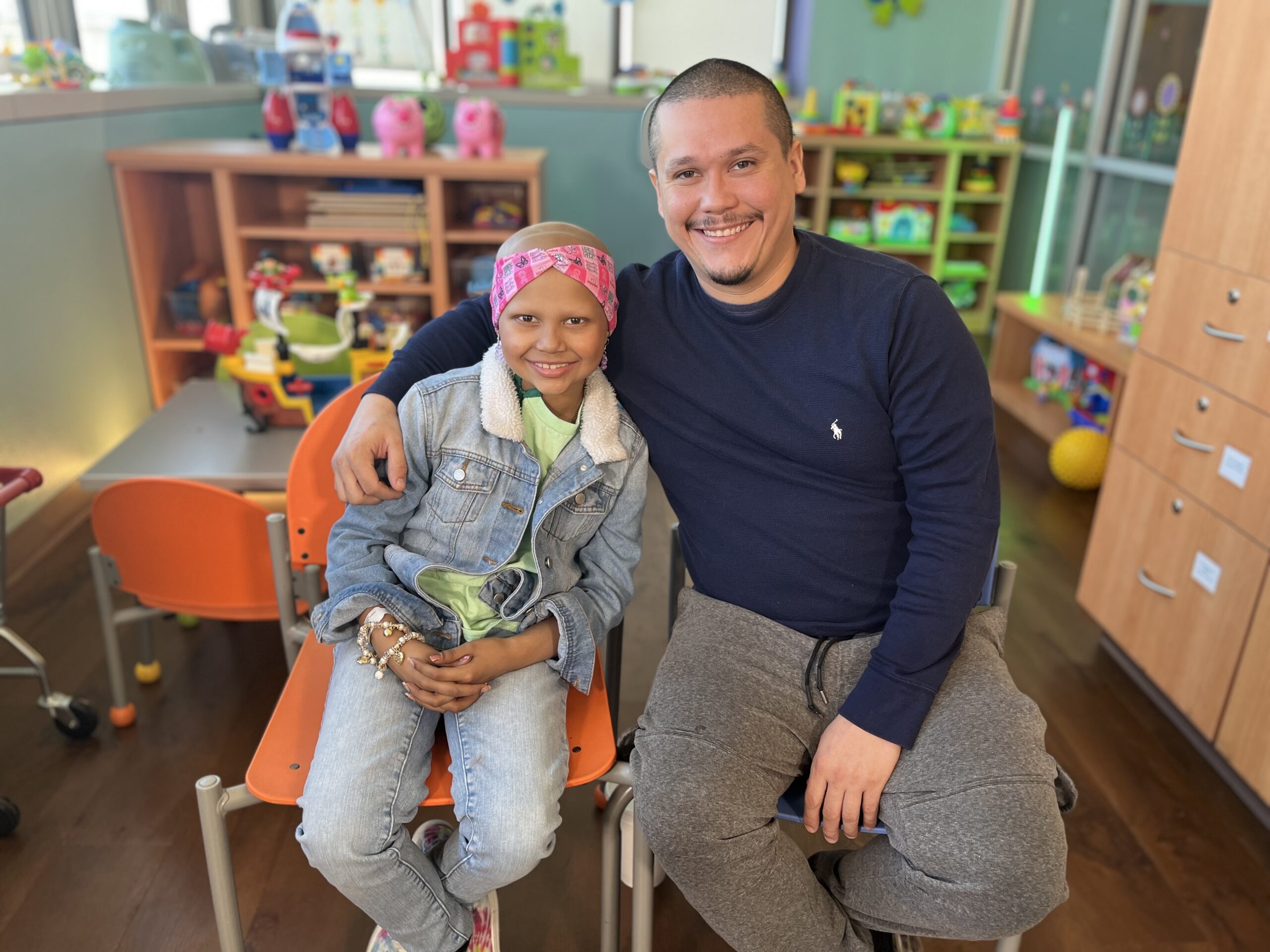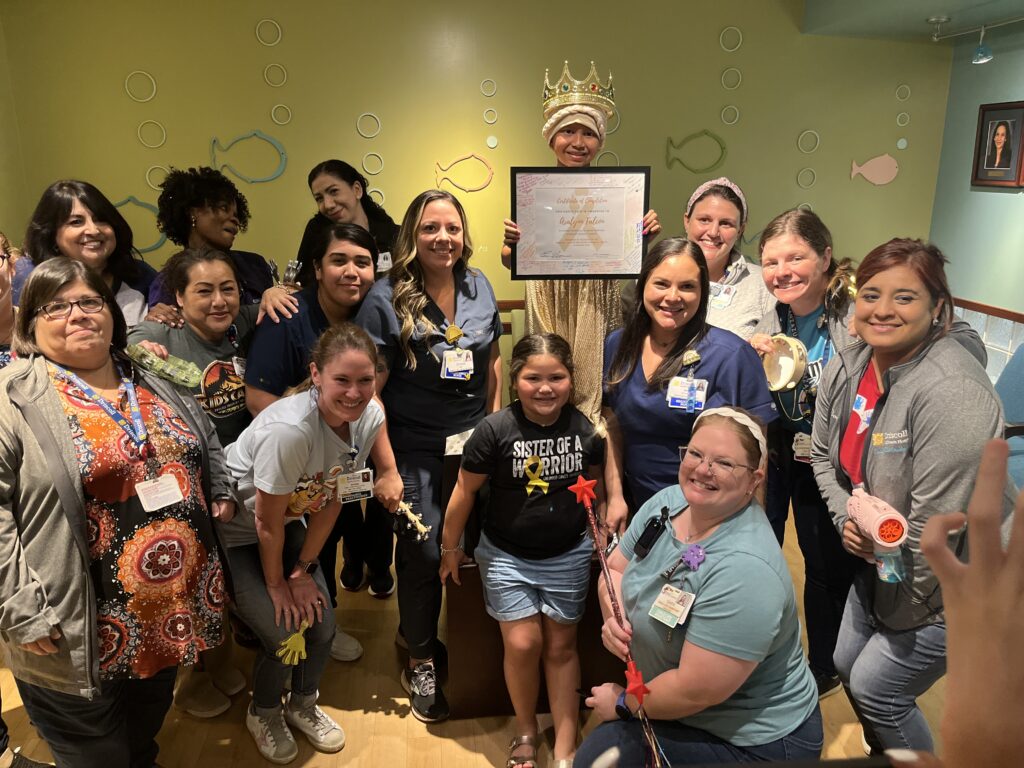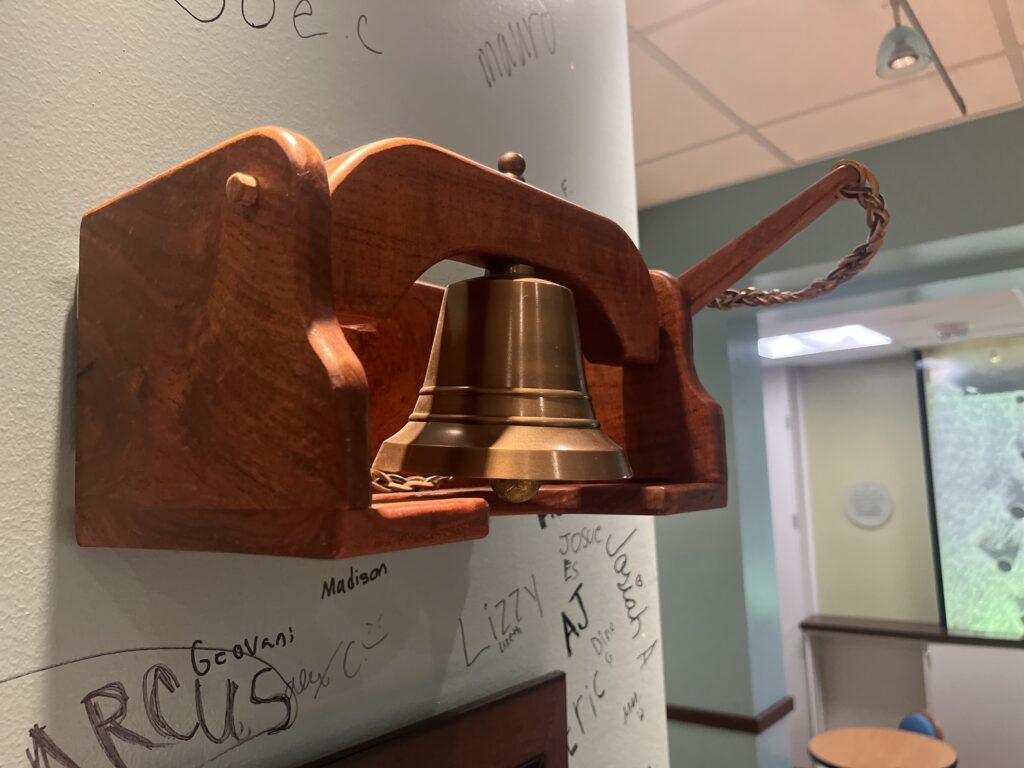
Little girls often dream of princess crowns, but sometimes life isn’t a fairy tale. Instead of carefree childhood days playing with her sisters, seven-year-old Aralynn Falcon found herself in so much pain that she could barely walk.
Doubled over with abdominal pain, her family sought answers, but the last thing on their minds was cancer.
“When it was first happening, she was just feeling a whole bunch of stomach pains, and we weren’t too sure what it was,” said Aralynn’s father, Devin Falcon. “It took a few weeks, a couple of different diagnoses, until we finally got our CT scans and found out there was a mass.”
The Falcon family’s world changed in an instant: Aralynn had cancer.
Diagnosed with rhabdomyosarcoma, a rare type of cancer that affects muscle tissue in children and teens, Aralynn’s cancer started in her stomach and near her liver.
“When you hear cancer, you just think the worst,” her father said.
But the Falcons would discover they had a team of pediatric cancer experts right in South Texas, ready to help them fight.
Confronting cancer head-on
Aralynn’s treatment began with 12 weeks of radiation and chemotherapy. Despite the challenges, she handled it well, even having an occasional nap during treatments. Shots and stethoscopes, monitors and medicine became her norm.
But at Driscoll Children’s Hospital, physicians and staff use a creative blend of treatment. Here, smiles, hugs and a soothing touch are as much a part of Driscoll’s approach to treating children as is its advanced medical treatments and technologies.
The Cancer and Blood Disorders Center at Driscoll is more than a medical hub, too; it’s a place of understanding and support. Skilled doctors not only provide top-notch treatment but help in ways that go beyond medical.
The hospital, with a long history of helping kids in South Texas, became a crucial part of Aralynn’s fight against cancer. For the Falcons, Driscoll became a second family.
“We got to know all the doctors, the nursing staff,” Devin Falcon said. “It’s been like another family during our journey here.”
Connected with the Children’s Oncology Group (COG), Driscoll Children’s Hospital plays a key role in revolutionizing childhood cancer treatment, contributing to the survival rate of almost 80% today. The Cancer and Blood Disorders Center takes part in clinical trials, showing the hospital's commitment to pushing research boundaries.
Dr. Nkechi Mba, director of the center, recognizes that cancer hits not just the child but the entire family, and the hospital aims to bring back health and the strength of family ties.
“The diagnosis of cancer does not just affect the child. It affects the whole family. It changes marriages, it changes people’s lives,” said Mba. “I feel very protective about my patients, you know, it almost feels like family... They’re actually a very big part of who I am.”

With 400,000 children diagnosed with cancer worldwide each year, the oncology department plays a vital role in saving lives. Dr. Catherine Boston, pediatric hematologist oncologist, points out the need for increased awareness of childhood cancers.
“We change the world by increasing awareness about pediatric cancer and blood disorders. I think as professionals, it’s our obligation and our duty to spread the word that children get cancer, that children get different kinds of cancers than adults, that there’s not enough funding for pediatric cancer — and that we need to change that,” she said.
Celebrating happily ever after
Aralynn’s recovery isn’t just a personal victory; it is a shared journey of resilience. For the Falcons and families facing childhood cancer, every victory is to be celebrated.
“I think we have changed the world by actually investing in cancer research and treatment,” Mba said. “Because I do think that if you cure a child of cancer, you give them back their whole life.”
Emerging from her treatment, Aralynn rediscovered simple childhood joys of art, like painting, and playing with her three sisters. When she falls down, she gets back up without the pain she once experienced.
Her father says they are happy to have had Driscoll by their side, helping them navigate through the darkest days.
“We still need a lot of people every day,” he said. “They’re still helping us get through. It gets us to focus on all the bright sides — the silver linings. There’s always a good reason to wake up. Just keep fighting and focus on all the good stuff in our lives.”

A significant milestone for Aralynn was a bell-ringing ceremony at Driscoll, signaling the end of her treatment. Her mom, Stephanie Juarez, recited a poem, which has become a Driscoll tradition:
“Your treatment is over. Hurray, hurray. Time for you to recover. You’ve earned the right to ring the bell. So, ring the bell three times now. Your day has come to ring it proudly. Tell the world your treatment is done. And here’s to lots of happy days to come.”
Aralynn donned her most sparkly and fanciest dress, but even her smile outshined it. She wore a princess crown like a badge of bravery — and the stuff of fairy tales.
She reached up. The bell rang out as she pulled:
One time.
Two times.
Three.
Cancer doesn’t mean the end, but the beginning of happily ever after.